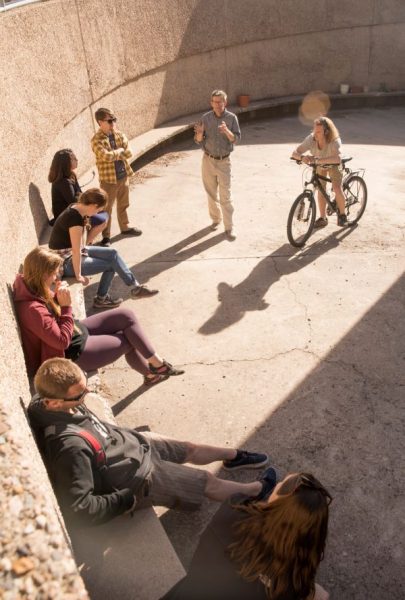
Northern Arizona University’s Department of Sustainable Communities has been inspiring and training students to make a difference in Flagstaff and throughout Arizona in sustainability, civic engagement, interdisciplinary research and social justice work for more than 20 years.
Peter Friederici, director of Sustainable Communities and professor in NAU’s School of Communication, credits the program’s start to his two former predecessors, program founder Sandra Lubarsky and Luis Fernandez, chair of NAU’s Department of Criminology & Criminal Justice.
The program now brings together eager students and community partners, such as the Black Mesa Water Coalition, Flagstaff Foodlink, Grand Canyon Trust, Northern Arizona Interfaith Council, and others in a wide variety of cultural, economic and environmental projects through place-based educational opportunities.
NAU Sustainable Communities received one of the first Southwest Health Equity Research Collaborative (SHERC) Community-Campus Partnership Support (CCPS) awards through a community partnership with Melissa Palmer, manager of the Mohave County Department of Public Health.
Together, they helped increase the amount of fresh fruit and vegetables being purchased and consumed in the Golden Valley by 10% as a way to alleviate insufficient access to fresh fruits and vegetables through a partnership with a local convenience store.
Q&A with Peter Friederici, director of NAU’s Department of Sustainable Communities:
How do students in NAU’s Sustainable Communities Program engage with communities?
What most excites me about the interdisciplinary work of students in the Master of Arts in Sustainable Communities is that they’re required to do active community engagement work. For quite a few, that means working with food systems.
Northern Arizona is full of food deserts where residents have trouble accessing fresh, healthy food. We’re trying to engage with some of those communities by supporting small-scale local producers who are growing both healthy food and healthy small businesses.
How did a SHERC grant help kick-start the program’s rural food systems work?
Our work in Mohave County began when the Mohave County Health Department received a SHERC Community-Campus Partnership Support award intended to improve food access outside Kingman. The work had to be altered because of COVID, but it has resulted in a fruitful partnership with a new local business, Rosebird Farms.
Two of our graduate students, Darren Bingham and Samantha (Sam) Hipolito, have worked hard to grow the business using social media and local and regional networking. They’ve helped the business establish a delivery service that’s now providing produce to rural communities outside Kingman.
How does this applied community work connect to students’ research?
Students in our program are able to do very practical work for their thesis. Both of the students working in Mohave County have chosen to do thesis research on food systems — Sam on how food distribution on the Navajo Nation was disrupted and altered by the pandemic, and Darren on how local food advocacy groups in Arizona define the word “local.”
It’s a nice synergy of academic research and on-the-ground work.
What’s next?
That one project has now grow into the Rural Foods Pathways Project, which this past winter sponsored a virtual Food Producers Summit that attracted some 150 participants. Later this year we’re looking to expand this model to some of the other counties in Northern Arizona.
As a journalist and writer, I’m thrilled to help students develop the means to tell stories about our diverse region, and about businesses and advocacy groups that are looking to make a difference.